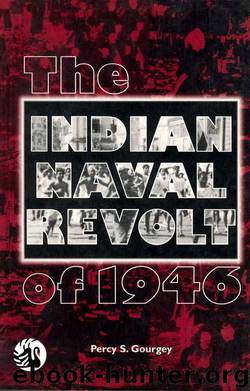The Indian Naval Revolt of 1946 by Gourgey Percy S

Author:Gourgey, Percy S [Gourgey, Percy S ]
Language: eng
Format: epub
ISBN: 978 81 250 4623 3
Publisher: Orient Blackswan Private Limited
Published: 2012-03-15T16:00:00+00:00
It was only by the late evening that those of us who had been trapped in the CCO were able to leave. In fact, this was the first point in the local settlement referred to above. But the settlement involved the central issue of surrender by the mutineers to the authorities. Since Castle Barracks was the main point of resistance in shore establishments, the settlement provided a pattern for the other establishments. The terms of the settlement included the unconditional surrender of all mutineers as required by the naval authorities. For their part, the latter expressed readiness to give full and early consideration to the ratings' grievances, the main one concerning speedy demobilisation and resettlement plans in civilian life. Although the surrender was to be unconditional, it was felt that an expression of readiness to consider grievances would be taken as a sign of the authorities' bona fides, which would be conducive to a calmer atmosphere. Arising out of the mutiny, however, and at the insistence of Congress leaders, the authorities had to make a 'gentlemen's agreement' that there would be no victimisation of the strike leaders. Nevertheless, the fact that the Congress party was now showing an increasing reluctance to support the mutiny, by not calling for a mass satyagraha and civil disobedience campaign, discouraged the ratings' leaders from continuing with the mutiny.
Congress party leaders, including Sardar Vallabhai Patel, publicly deplored the situation in the city and appealed to every responsible person to see that peace was restored between the parties and that Bombay city was not plunged into trouble. He further stated that the Congress party was doing everything to help naval ratings out of their difficulties.
For the following day, Friday, a general stoppage of work or hartal had been scheduled by the Congress as it was the anniversary of the death of Kasturba Gandhi, the beloved wife of the Mahatma, who had died in gaol after revolutionary incidents had broken out all over the country in 1942 when the Congress was declared to be an illegal organisation on the passing of the 'Quit India' resolution.
However, as a result of their bitter experiences of past disturbances, the Congress leaders called off the proposed stoppage of work which would have aggravated the situation even more.
All the officers of Castle Barracks were required to report for duty at RIN headquarters and the CCO, late on the evening of Day Four, for various missions.
One of these was to split up into units of two officers accompanied by two military policemen touring the city in a jeep and rounding up roving gangs of mutinying sailors.
Another far more prosaic job was to sort out from among the records kept at HQ the cases of those ratings with long-standing requests for leave or release or grants of pay and prepare suitable recommendations for settling such requests.
Yet another was to try and intercept signals between mutineers in shore establishments to gauge their reaction to the state of siege imposed upon them by the military authorities.
Download
This site does not store any files on its server. We only index and link to content provided by other sites. Please contact the content providers to delete copyright contents if any and email us, we'll remove relevant links or contents immediately.
| Africa | Americas |
| Arctic & Antarctica | Asia |
| Australia & Oceania | Europe |
| Middle East | Russia |
| United States | World |
| Ancient Civilizations | Military |
| Historical Study & Educational Resources |
Empire of the Sikhs by Patwant Singh(23070)
The Wind in My Hair by Masih Alinejad(5090)
Rise and Kill First by Ronen Bergman(4778)
The Templars by Dan Jones(4681)
The Rape of Nanking by Iris Chang(4201)
12 Strong by Doug Stanton(3541)
Blood and Sand by Alex Von Tunzelmann(3193)
Babylon's Ark by Lawrence Anthony(2671)
The History of Jihad: From Muhammad to ISIS by Spencer Robert(2618)
No Room for Small Dreams by Shimon Peres(2362)
The Turkish Psychedelic Explosion by Daniel Spicer(2353)
Inside the Middle East by Avi Melamed(2349)
Gideon's Spies: The Secret History of the Mossad by Gordon Thomas(2337)
Arabs by Eugene Rogan(2292)
The First Muslim The Story of Muhammad by Lesley Hazleton(2263)
Come, Tell Me How You Live by Mallowan Agatha Christie(2249)
Bus on Jaffa Road by Mike Kelly(2150)
1453 by Roger Crowley(2022)
Kabul 1841-42: Battle Story by Edmund Yorke(2021)
